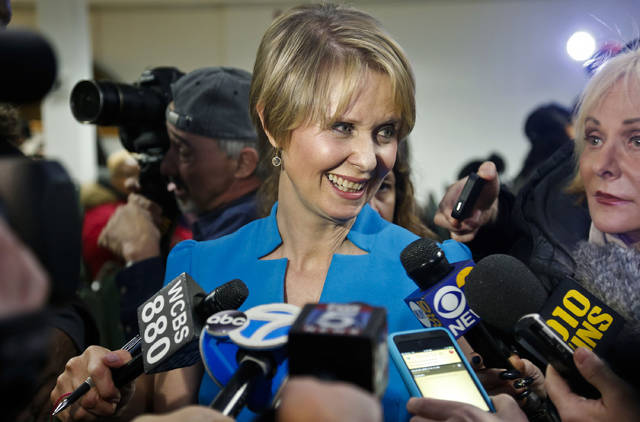ALBANY, N.Y. — In her first appearance as a New York gubernatorial candidate, “Sex and the City” star Cynthia Nixon hammered her Democratic opponent Gov. Andrew Cuomo on the crumbling subway, the “cesspool” of corruption in state government and inequality across the state. But she couldn’t escape what she didn’t mention in her speech, her sexual orientation.
Nixon, who if she wins would become the state’s first openly gay governor, was asked by reporters about a comment made by former New York City Council Speaker Christine Quinn, a gay Cuomo supporter who called Nixon an “unqualified lesbian.”
“My being a lesbian or her being a lesbian I think has nothing to do with why we’re running for office,” Nixon told the scrum on her way out of an appearance this week in Brooklyn.
“I think it’s time for an outsider,” she said. “I think it is time, not just in New York state but all over this country, to hear from the voices of real people who understand that our government … is in the clutches of millionaires, billionaires and corporations.”
The dustup over Quinn’s remark, for which she later apologized, highlighted what could become a reality of Nixon’s campaign leading to a September primary against the two-term incumbent Cuomo: Whether she likes it or not, Nixon will be forced to confront the issue of her sexuality and stand on gay rights.
That’s especially true against a governor who has long gotten strong support in the gay community for his staunch fight for legislation in 2011 that allowed same-sex couples in the state to marry.
Just last month, the nation’s largest LGBT civil rights organization, the Human Rights Campaign, endorsed Cuomo for re-election and also honored Nixon with a Visibility Award for using “her talent and public platform to speak out for equality in this country and around the globe.”
For now, Nixon’s entry into the race this week hasn’t appeared to shake Cuomo’s support. Most major gay rights advocates and groups, both nationally and in New York, say they are either sticking with Cuomo or staying neutral, noting that LGBT issues are important but not the only factor to consider.
“Just because a candidate like Cynthia is LGBT, that doesn’t mean that’s just what she’s running for,” said Sean Meloy, political director for the LGBTQ Victory Fund, a Washington, D.C.-based organization that works to get LGBT people elected to government offices but has not yet jumped into this race. “I don’t think people look at LGBT candidates purely as a LGBT candidate.”
Nixon underscored that herself this week in her two-minute campaign announcement video on Twitter, mentioning such issues as crumbling infrastructure, income inequality and sagging upstate economies, but not a word about gay rights.
By Wednesday, she appeared to embrace the “unqualified lesbian” dig, going on Twitter to announce a campaign event at the Stonewall Inn, birthplace of the gay rights movement.
“Calling all qualified and unqualified lesbians and everyone who wants funded schools, affordable housing & working subways,” she wrote.
The 51-year-old New York native and Grammy, Emmy and Tony winner has never held public office, but as an activist she has lobbied extensively for better education funding and advocated for gay rights.
Nixon, who had two children with longtime partner Danny Mozes, came out in 2004. Eight years later, she married Christine Marinoni, who worked for New York City Mayor Bill de Blasio as a special adviser for community partnerships in the city’s education department. Nixon and Marinoni have a young son.
Nixon received some backlash in 2012 when she told The New York Times Magazine that being a homosexual was a conscious choice for her. “I understand that for many people it’s not, but for me it’s a choice, and you don’t get to define my gayness for me,” she said.
After some gay activists complained that Nixon’s remarks could be used to deny a biological basis for homosexuality, she told The Advocate magazine, an LGBT publication, that she’s technically bisexual, and not by choice.
For his part, the 60-year-old Cuomo is a career politician with an extensive record of championing gay rights. In addition to legalization of same-sex marriages, Cuomo ordered state authorities to prohibit discrimination based on gender identity, issued an executive order prohibiting health insurers from denying coverage based on gender identity and barred state mental health facilities from offering conversion therapy.
Cuomo “has the best record of accomplishment on gay rights of any elected official in America,” said Richard Socarides, a former Clinton White House adviser on LGBT issues. “He’s a true progressive and he will be hard to beat.”
Ethan Geto, a gay-rights activist and political consultant, said Nixon had established her credibility as a thoughtful activist, but predicted that Cuomo would win “the lion’s share” of the LGBT vote in the September primary. He said Cuomo “has been far and away the most progressive and effective champion of gay rights in the history of the governorship.”
Human Rights Campaign President Chad Griffin called Cuomo “a national champion for the LGBTQ community, with a proven track record of increasing much-needed protections and advancing equality for all New Yorkers.”
Still, Cuomo does have some vulnerabilities. Some in the LGBT community think he was late on some of its issues, noting New York was the seventh state to allow people of the same sex to legally marry, seven years after Massachusetts became the first and six years after Connecticut became the second.
“Nixon can make the case, did you lead the charge? Can we count on you to be a leader?” said Fordham political scientist Christine Greer.
Cuomo made his first public comments about Nixon at a news conference Wednesday on the nor’easter. When asked about her, Cuomo responded: “We’re in the political silly season now. I’ve been here before. We’re in a democracy, anybody can run. Anybody can say whatever they want to say.”
———
Associated Press National Writer David Crary contributed to this report.


